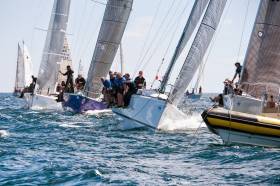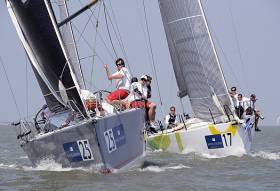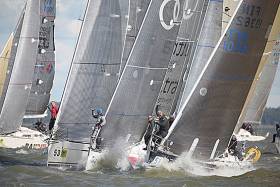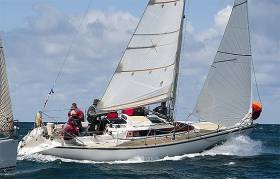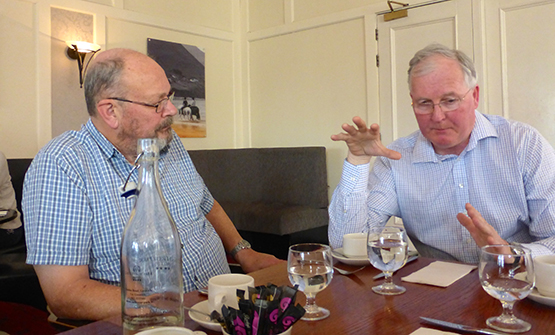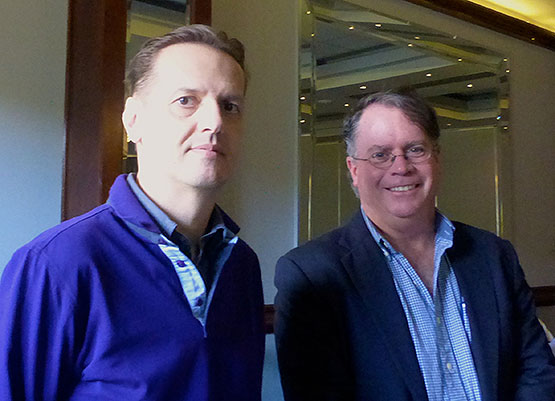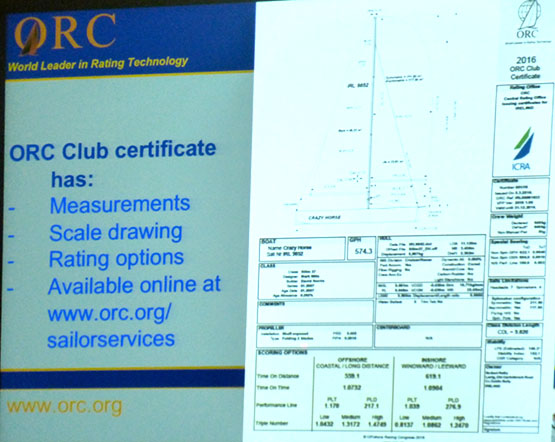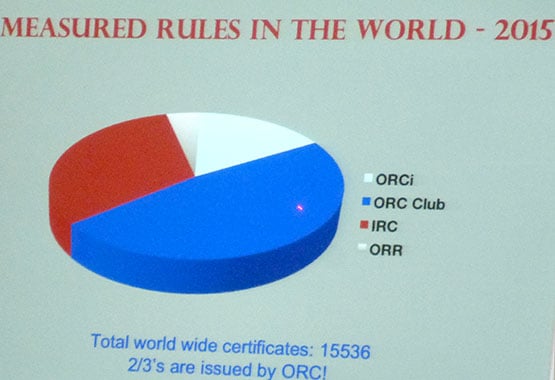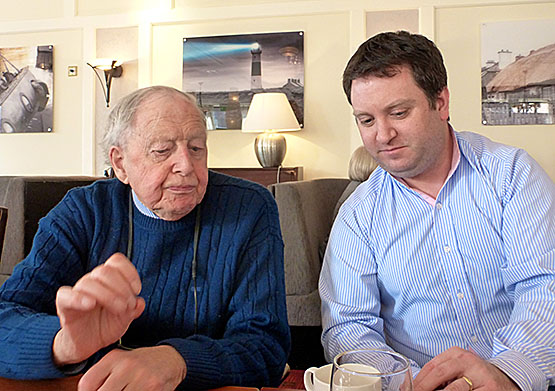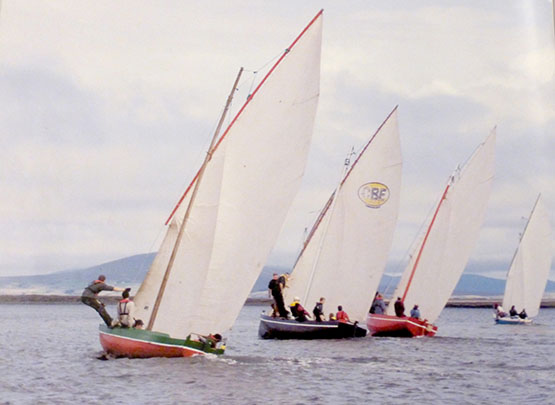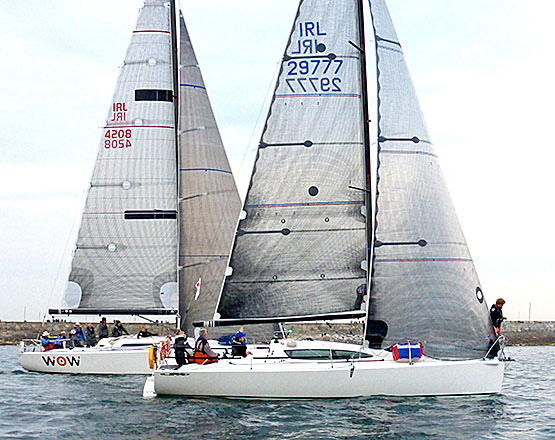Displaying items by tag: IRC
The Royal Ocean Racing Club (RORC) is promoting its inaugural European IRC Championship as part of Cork Week. The London club says the event will 'bring countries together'.
The International IRC Rating Rule, jointly owned by the Royal Ocean Racing Club (RORC) and l’Union Nationale pour la Course au Large (UNCL) will be attracting boats from all over the world to the port of Crosshaven in Ireland this year. From 10th to 15th July 2016 the Inaugural European IRC Championship will be take place during the already well-established and popular Volvo Cork Week hosted by the Royal Cork YC, the world’s oldest yacht club.
This exciting addition to the global IRC racing calendar promises to bring boats together from all corners of Europe, where over 4300 boats are IRC rated annually, but is open to all 6000 boats IRC rated worldwide. The Championship invites entries from boats with a valid 2016 IRC rating between 0.850 and 1.320 and the RCYC is expecting entries from 'around the globe'. Early entries include boats from Ireland, Northern Ireland, the UK, France, the USA and Australia, with interest from South Africa, making it a truly international event.
Back in 1990 Cork Week was the first regatta in the world to use the now ubiquitous windward/leeward race format, but even then the regatta included an innovative and varied mix of racing and 2016 is no exception: courses at the European IRC Championship will include Olympic, trapezoid, slalom and windward/leeward buoy courses plus an 8 hour coastal race, so every boat has a chance to shine on their preferred course type. Results will be calculated using the simple time-on-time IRC time corrector, so competitors can easily see how they are performing around the course.
Another addition to the Week this year is the inaugural International Inter Services Sailing Competition, the Beaufort Cup. Volvo Cork Week 2016 is shaping up to be another unforgettable regatta, and if you have a 2016 IRC rating you can be part of it!
RORC Defends IRC Handicap Following Irish ORC Presentation
The Royal Ocean Racing Club (RORC) in London says a 'correction is needed' over information contained in an article following an ORC presentation at the ICRA Conference in Limerick, a week ago. Michael Boyd, the Commodore of RORC, says the offshore body 'read with interest', and 'some confusion', the press release by the ORC. Boyd says he feels 'very strongly' that information put forward by Dobbs Davis, Chairman of ORC’s Promotion and Development Committee, 'needs correcting'.
In a statement issued by RORC, who administer the rival IRC system, the club says:
First, the numbers presented are wrong. Dobbs quotes the number of ORC certificates in total up until the end of the year, but only quotes the number of boats in IRC until the end of August of 2015. These are very different figures. Dobbs quotes 4958 for IRC in 2015 but the real number of certificates for the whole year is 7721. That makes the graph look very different and makes IRC the largest individual system in 2015 with ORC Club behind it at 7404 and ORCi trailing at 2492.
It should also be noted that both IRC and ORC are International Rating Systems recognised by World Sailing and IRC is currently in discussions with World Sailing about having its own World Championship. Rather than having two world championships for offshore boats, we are supporting the WS initiative to have one jointly scored IRC/ORC world championship which will allow the event to travel to other continents.
IRC is expanding with new territories in India and Taiwan, growth in Japan and China and very encouraging numbers for the start of the year from many Northern European countries.
IRC is also flexible and not limited to using time-on-time scoring - as has also been suggested. A simple time-on-distance calculation can be applied to create a time-on-distance value, should race organisers want to use it. Similarly, crew number or crew weight can be applied depending on the race organiser’s needs and wishes.
IRC is doing a great job for our sport – you only have to look at the style of boats that have developed since the demise of IMS (the basis of ORC) to understand that IRC is a progressive rule – with the latest generation of boats being fast, safe and fun to sail. Our goal is to ensure that we provide a first class service and develop a product that is constantly evolving to make sure that racing under IRC is as fair as is possible.
- Michael Boyd, Commodore, ROYAL OCEAN RACING CLUB
ORC Interest From Ireland at the ICRA Conference
At the annual meeting of the Irish Cruiser Racing Association (ICRA) in Limerick last weekend, past president Norbert Reilly invited representatives from the Offshore Racing Congress (ORC) to address the assembled crowd of over 60 delegates on features of ORC’s rating systems. Here the ORC's Dobbs Davis gives an overview of the Irish presentation.
The interest from ICRA is in response to the recent growth and popularity the ORC system has seen in recent years around the world: the system issued over 10,000 certificates in 2015 in some 40 countries, has been growing yearly while other international systems are struggling, and yet its not in use at all in Ireland.
What the delegates saw was a presentation on the history of the organisation, which goes back over 40 years into the IOR era, over a decade in IMS, and is now emerged as an improved and accessible science-based system suited for a wide variety of boat types that generates three distinct styles of rating certificates: ORC Club, ORC International, and ORC Superyacht. Of the 15,000 measurement-based certificates issued around the world, two-thirds are issued by ORC in one of these three formats.
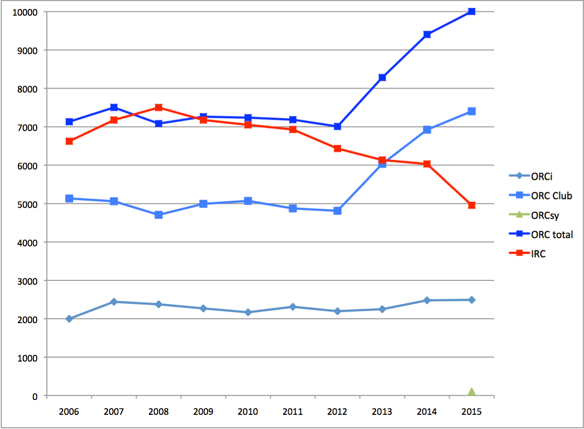
A plot of the growth of ORC contrasted to IRC in the last 10 years
There are five salient features of the system: that it is objective and science-based, it is open and transparent to use, it is accessible online, it is flexible with a variety of scoring styles suited for different types of racing, and that its affordable.
The objectivity comes from use of a sophisticated Velocity Prediction Program (VPP) which through input of measurements of a boat’s hull and appendage profiles, its rig and sail dimensions and other inputs, can calculate the boat’s theoretical speed in a variety of conditions of wind speed and wind angles. To remain relevant to modern designs and improve the methods used in the VPP calculations, it is developed continuously by experts on the International Technical Committee (ITC), which includes talent such as Andy Claughton from the Wolfson Unit at Univ. of Southampton (and now the BAR AC programme), designers Jason Ker, Shaun Carkeek, and others from Farr Yacht Design, Judel/Vrolijk and others.
In fact, the ITC is meeting soon in Annapolis USA to discuss improvements in a variety of areas in response to inquiries from users. This is an important feedback loop that ORC has to continually seek to improve the accuracy of its system. The ORC VPP and its rules are not secret, and are available for download at the ORC website (www.orc.org).
Because the system is open and transparent, ORC has worked hard to make it as accessible as possible to its users. All valid ORC Club and ORCi certificates issued since 2009 are available from ORC’s unique portal to its rating system, the ORC Sailor Services. After registering for a free log-in credential, anyone can access these certificates for free, as well as some 88,000 measurement records that date back 20 years into the IMS era. The searchable database can be used to research the measurements and ratings for any boat in the system, run a test certificate on the current ORC VPP, run a Speed Guide report of the polar performance of the boat or a Target Speed report of the boat’s polar speed targets on a windward-leeward course.
The system also has an edit function that allows a boat’s measurements sails, spars, or crew weight to be changed so that test certificates can be run to explore the effects of these changes on rating. Test certificates are not valid for racing, but can give the user insight on how to optimise their boat for performance…most systems discourage this with limits and high costs placed on test certificates, but ORC’s open approach allows this to better educate its users on their set-up options.
Because the “rating” for a boat is in fact a matrix of speed values generated by the VPP, ORC’s scoring options are varied for use by race organisers: they can be very simple, where all wind angle and wind speed predictions are condensed into a single number, or quite complex, where inputs of wind angle and course length are used to model the boat’s speed around the course, and their corrected time is calculated based on their relative performance to their competitors on this course.
There is also a hybrid approach, called Triple Number, where for either an inshore or offshore course the ratings are expressed as a function of Light, Medium or Heavy wind speeds. This is a very common scoring style used in ORC Club fleets.
Because ORC uses numerous measurements of a boat’s hull, rig and sails, and there are a variety of scoring options available for race managers, there is less tendency for type-forming rating bias in specific designs such as seen in other single-number systems. This allows the system to be more fair across a wide spectrum of boat types and styles, and the test fleet used to evaluate the system is comprised of some 1500 different designs. It’s thus less relevant to label a boat as being “an ORC design” like is typically seen in other systems.
Proof of this can be seen in the results of the highest-level ORC Championships, the Worlds and the Europeans: recent podium finishers have been not only top-level pro teams sailing on full-race boat types, like TP 52’s, GP 42’s, etc, but well-prepared teams racing production dual-purpose designs as well, such as Swan 42’s, Swan 45’s, X-41’s, X-37’s, etc. The racing at ORC championships is popular – over 100 entries from over 20 countries in the last 5 years at the Worlds – and its close: races are often won and lost by mere seconds in corrected time.
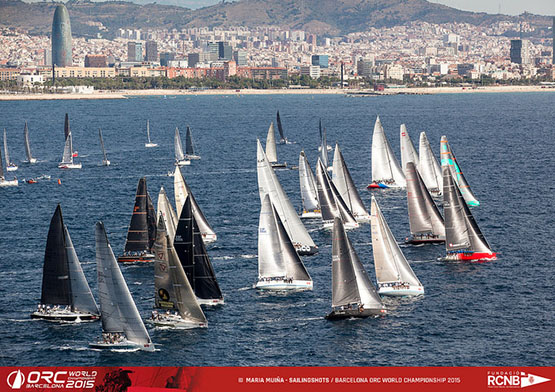
The ORC 2015 World Championships off Barcelona
This year’s ORC World Championship will be in Copenhagen at the Royal Danish YC over July 15-23, and the ORC European Championship will be over July 3-10 in Porto Carras, Greece. There are already 130 entries are signed up for the Worlds, which promises to be another great week of inshore and offshore racing.
The ease and affordability of ORC certificates is determined by the policies and prices set by national rating offices, who are not centrally controlled but have all the tools needed to generate their own ORC certificates for their local customers.
Response to the talk on ORC was generally well-received by the ICRA audience, with particular interest from the fleet in Dublin Bay to try some ORC Club certificates and look at some dual-scoring exercises in the coming season. The attraction expressed to use of ORC is being able to have multiple scoring options to differentiate more fairly across varied boat types in the same race, and the general openness and objectivity of the system.
Dobbs Davis is ORC Media Consultant
Read also: Crazy But It Works: ICRA's Success Is a Highlight of Irish Sailing Scene
The Irish Cruiser-Racer Association (ICRA) is a unique organisation. “Run by sailors for sailors”, it is nevertheless a very land-centric administrative body whose only manifestation afloat as a group with its own identity is seen at the organisation of the annual ICRA Nationals. And the sense of it relating purely to the island of Ireland is accentuated by the fact that much of its work is essentially back-office activity, dealing with handicaps and all the other paraphernalia involved in providing the nation’s numerous and very diverse cruiser-racer fleet with meaningful racing. W M Nixon went to last Saturday’s ICRA Conference to get a flavour of what ICRA does, and came away both impressed and stimulated.
Sweeping along southwestward towards Limerick on our wonderful motorway system, while one’s body stays firmly on the dual carriageway, the mind can wander into any pathways it wishes. So we got to thinking that, in this age of increasing numbers of administrators trained to third level degrees in the running of not-for-profit organisations, it’s a bit odd to find a very successfully central organisation which is apparently run – and well run at that - on a Corinthian basis “by sailors for sailors”.
Surely in today’s climate, which favours key bodies such as this being run by highly-trained specialists on at least a semi-professional basis, a seemingly amorphous organisation which is “run by sailors for sailors” is verging on a clear case of the asylum being taken over by the lunatics?
We’d soon see. Meanwhile, why on earth hold an annual conference in Limerick? With Ireland’s population distribution changing so rapidly, skewing both towards the large urban centres and particularly towards the east coast and Dublin, surely anyone organising a national conference would find it attendee-friendly to look at the latest map of population weighting. As it happens, I’m not sure that such a map exists, but we’d like to think that with today’s computers it is possible to construct a map where, after due calculation, you could pinpoint to the exact centre of Ireland’s total population distribution.
So you set out heading for Limerick at an unfeasibly early hour thinking that maybe a central location such as pretty Portlaoise or tidy Trim would probably be Ireland’s central point in relation to population distribution. But after some smooth time on the road with the sense of the wonderful west coast coming ever nearer, you begin to wonder why ICRA didn’t make a proper job of it, and take us to Dingle where we can breathe that wonderful Atlantic air and think great thoughts of sailing the high seas.
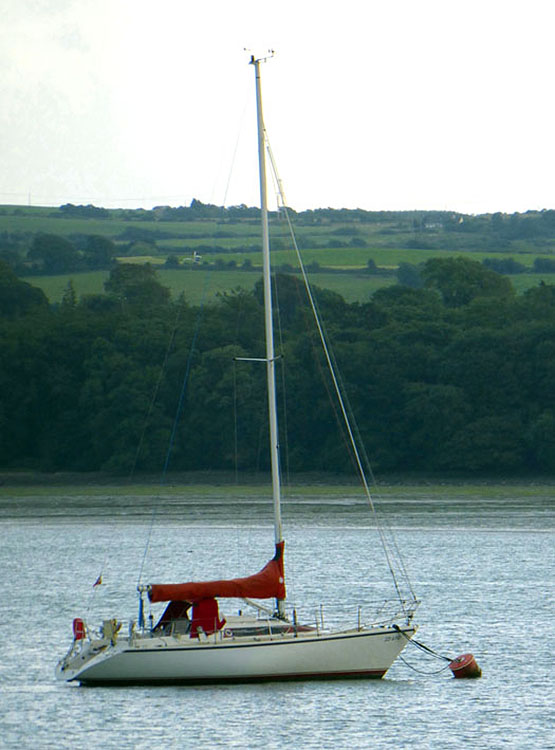
Far from the pressures of the cities of the east and south coasts, Dis-a-Ray is moored in the peaceful surroundings of Tarbert, where the south shore of the Shannon Estuary has already become part of the Kingdom of Kerry. Photo: W M Nixon
As it is, though the Dubs may think of Limerick as being on the western seaboard, it’s actually remarkably central when you draw lines across Ireland between all the best sailing locations. And as we knew that the position of Commodore of ICRA was going to pass on Saturday from Nobby Reilly of Howth (the Dingle of the East Coast) to Simon McGibney, Limerick was just about spot on in terms of equal travel time. For although the new Commodore has Foynes YC on the Shannon Estuary as his home club, his Dehler 101 Dis-a-ray is actually moored at his home at Tarbert which is further west down the Estuary, so much so that Tarbert is in the Kingdom of Kerry.
We arrived in to find a virtually full house distributed around a room-circling table such as they use for international diplomatic conferences to make peace with rogue states, with the layout being planned so that everyone can be an equal participant. It was grand for those of us who had arrived in the nick of time to get a seat, as we’d the fully-equipped table in front of us (did anybody else find it the devil’s own job to open the rather good but tightly-wrapped little sucky sweets which are essential to a talking shop?), but being Ireland several people arrived late, the show was already on the road, and they’d to find a seat as best they could.
All of which meant that there was a bigger turnout than expected, which is good news for ICRA. And for those of us comfortably ensconced, it made for a fascinating throughput of information by a long list of speakers, even though the layout meant that networking was restricted to the one hour lunch break if - like many people - you were relying on the 3.30-3.45pm wrap-up to facilitate returning to Dublin or Cork or wherever for a completely different event that night.
From the beginning, the dominant theme was on how we get more people into sailing, and everyone blithely talked as though we’re offering Joe Public a warm and sunny Croatian sailing product right here in Ireland, cheerfully ignoring the fact the last two summers have been plain lousy in terms of good weather.
Certainly the sailing was great for the enthusiast, but can you imagine a newcomer to the rough and ready sailing world wondering where on earth the attraction of it all was to be found as they were blown and bashed around at what we thought of as the utterly wonderful ICRA Nationals at Kinsale in June, or took in the all-too-typical variety of Irish summer weather at the hugely successful Volvo Dun Laoghaire Regatta in Dublin Bay in July?
Yet there is a fresh demand out there, and two of the morning’s speakers, Alistair Rumball of the Irish National Sailing School in Dun Laoghaire and Des McWilliam of McWilliam Sailmakers in Crosshaven, gave excellent talks on encouraging it, with Alistair showing us how his programme of moving beginners through dinghies and on into the school/club’s1720s, then became an inevitable progression into gaining experience and instruction on the school’s Prima 38 Lynx.
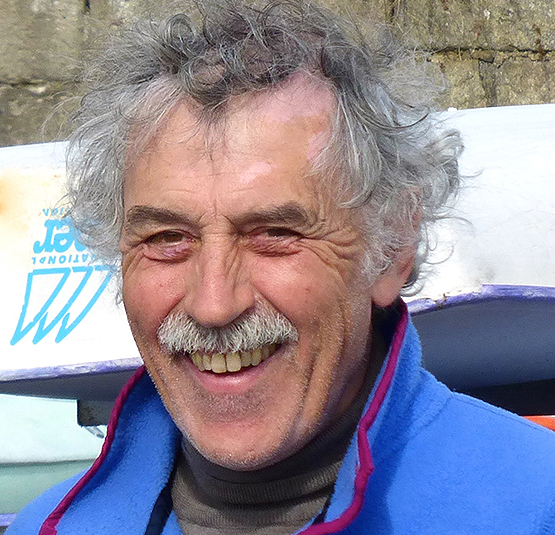 The mover and shaker. Alistair Rumball’s Irish National Sailing School in Dun Laoghaire is first port of call for many newcomers to sailing. Photo: W M Nixon
The mover and shaker. Alistair Rumball’s Irish National Sailing School in Dun Laoghaire is first port of call for many newcomers to sailing. Photo: W M Nixon
“Lynx has been a greater success than we could have ever dreamed of” he said. “She has been so booked out with people keen to learn about sailing a cruiser-racer that we haven’t been able to get as much actual racing with ISORA and so forth as we’d like. But for 2016, she’s being taken out of our Dun Laoghaire setup for long enough to be organised for a proper shot at the Volvo Round Ireland”.
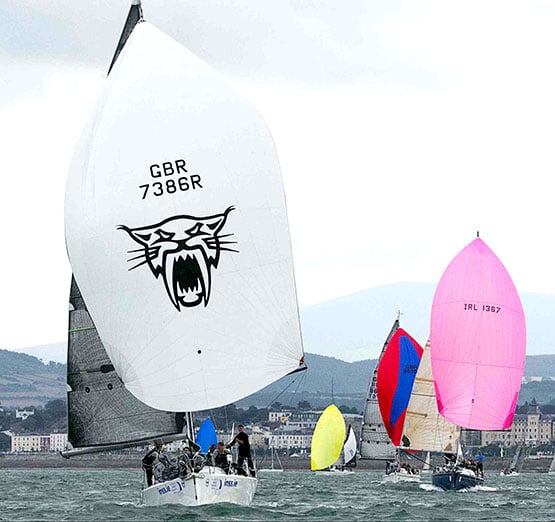
The double life of a Prima 38. The INSS’s Lynx in full racing mode in Dublin Bay (above), while below she is seen in early training mode as she takes a crew of beginners in cruiser-racing out for some formative experiences
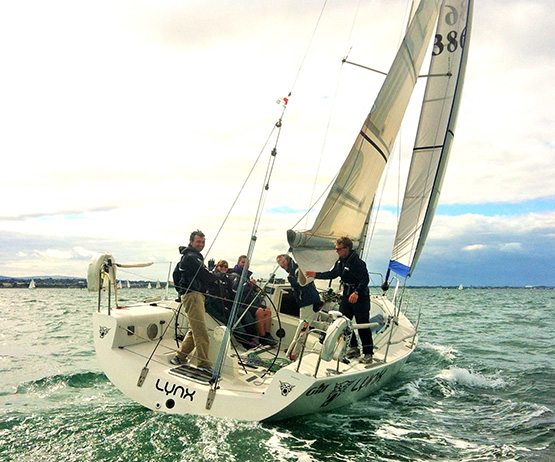
As of last weekend in Limerick, there were just two crew places left aboard Lynx for this year’s Volvo Round Ireland on June 18th, and they’ve probably been snapped up by now. But the Rumball presentation underlined the fact that there are people out there who are mad keen to get into cruiser-racing, and it was up to ICRA to guide its members as to how best to tap into these wannabee sailors, instead of bleating all the time about how hard it is to find crew.
Des McWilliam leapt into the same theme, and gave us a crash course in how to make crewing on your boat more attractive to strangers. Admittedly the experience of seven years of acute economic recession have understandably made those who have kept boats in racing commission more than a little stressed. But if they want to reap the benefits of having struggled to stay in the boat-owning stream, then they have to make their cruiser-racers pleasanter to sail on, and more effective racing machines.
The McWilliam message was blunt in the extreme. “As a sailmaker in Ireland, each year I will race actively at many venues on upwards of 40 boats, both evenings and weekends. I will experience many different management and sailing styles. At the end of the year looking back, I usually realise that there might be only ten to a dozen boats out of that total of forty to which I would gladly and freely return for the good sport, the efficient sailing, the successful racing, the camaraderie – the fun. The rest of them are just work, involving duty visits. Please remember this when you are setting up the running of your boat, and trying to encourage people to sail with you.”
Des McWilliam of Crosshaven and Rory Staunton of Mayo. Des provided the meeting with some telling home truths about how attractive (or not) cruiser-racers throughout Ireland can be to sail on, while Rory Staunton led the charge in wondering why ORC and IRC cannot be amalgamated, and then went on to outline a new trailerable 33-footer he and an international group of friends are developing to make the incomparable west of Ireland a more accessible sailing area
We earned our lunch by going through an intensive session with Dobbs Davis of the Offshore Racing Congress, who had come to the conference with Zoran Grubisa to promote their measurement rule, which is used worldwide anywhere that IRC is not dominant, and in some key events such as the Rolex Sydney-Hobart Race, they are used in tandem, though IRC is currently the more-used system in that classic event.
It says everything about how Irish sailing punches way above its weight that these two guys thought it worth their while to come among us and evangelise for their system in a country which has a more-than-friendly relationship with the IRC and the people who run it. But it was fascinating stuff, making an input which added real spice to the day.
Davis is Chairman of the ORC’s Promotion & Development Committee, while Grubisa heads the Rating Officers Committee, and they run a system which is now the ISAF-approved rating method for the ISAF Offshore Worlds, which this year will be staged in Copenhagen in July, which as it happens is more or less the same time as the Royal Cork YC will be staging the new European IRC Championship in Volvo Cork Week at Crosshaven.
So the presence of the evangelists from the ORC at the ICRA conference could have opened up a right can of worms, but fair play to Dobbs Davis, he gave such an enthusiastic and lucid explanation of the completely transparent way in which ORC function that, for the time being at least, one’s instinctive loyalty to IRC was suspended out of intellectual curiosity.
Leading Offshore Racing Congress officers Zoran Grubisa (left) and Dobbs Davis were in Limerick to evangelise for the ORC Rating system
While IRC still has one or two hidden elements – the “Black Box” factor – with the transparency of ORC, you can always see how different inputs are effecting the final figure. One-design sailors may find all this utterly yawn-making, but as Davis pointed out, although there are so many successful cruiser-racer One-Design classes in America that ORC has yet to gain significant traction there despite being first set up in the US forty years ago, elsewhere in the world more and more people are coming to ORC as they enjoy watching boat innovation and performance analysis interacting to make their sailing more interesting and the results indicative of pure sailing ability.
The approachability of the ORC system was presented as one of its advantages
The slice of the cake worldwide for the different rating systems
But as we all know, where IRC and OCR are run side-by-side, despite the IRC’s hidden elements the two outcomes are often very similar. And in Ireland where we have a soft spot for the old S&3 34s which set world alight in 1969-73, the fact that the veteran though beautifully restored S&S 34 Quikpoint Azzura was overall winner of the Rolex-Sydney Hobart Race under OCR, after so nearly doing it on IRC, caused a bit of heart-searching. But nevertheless Rory Staunton from Mayo SC spoke for many when he demanded to know why IRC and ORC couldn’t get together and resolve their small differences for the general benefit of the offshore racing fraternity. Dobbs Davis said his door was always open, but that began to feel a bit too reminiscent of the current efforts to form a government, so we were glad enough to take a break for lunch and then return to the rating topic, but from an entirely different point of view
The inevitable expense in maximizing your boat’s performance potential under either IRC or ORC made the sheer economy of ICRA’s Progressive ECHO system seem immediately attractive, and the lead-in the afternoon session by SCORA Commodore Ronan Enright even more apposite. Because the fact is, you could run the Progressive ECHO Handicap System without even knowing what a boat looks like, let alone having her dimensions measured do the last millimtre.
Donal O’Sullivan of Dublin Bay SC, and Ronan Enright, Commodore SCORA, discussing sailing administration matters during the lunch break at Limerick. Enright went on to give an illuminating presentation about developments in Progressive ECHO Photo: W M Nixon
In the absence of ICRA’s ECHO supremo Denis Kiely - unavoidably absent for family reasons – Ronan Enright gave a quietly telling performance. It’s fascinating that though ECHO started life as the East Coast Handicap Organisation back around 1971-72, it’s now a nationwide service overseen by ICRA, and its most active area of development is in the cauldron of concentrated cruiser-racing which you find when the activities of Cork Habour and Kinsale are combined.
Basically, Progressive ECHO depends on the results of the most recent race, after which, if certain criteria have been fulfilled, the results are automatically re-computed to give boats a new rating based the supposition that they had all finished dead level on handicapped time. My own most recent experience of racing with it when it is being enthusiastically applied was in the Volvo Dun Laoghaire Regatta, which was a perfect test-bed for the system, as it was a compact series with the same fleet throughout.
The result is a series-long level of commitment by boats and crews who, under a more brutal system, would have seen their interest and enthusiasm flag after Day Two or even earlier. So really the message is: If we’re trying to get people to enjoy sailing and particularly to enjoy racing which is what the non-involved most easily comprehend, then Progressive ECHO is doing more to get bums on boats than anything else in Irish sailing, for believe me you have never seen anything quite so heart-warming as the response of a crew who, under One-Design or fixed handicap systems, had not been at the races at all, yet suddenly under Progressive ECHO they find they’ve recorded a win.
Which was all good news but perhaps the most interesting revelation of all from Ronan Enright was that the top IRC racers around Cork are now taking a closer interest in their Progressive ECHO showing than there are in their IRC results. For under IRC, they know they’ll be in the top six, but each post-race adjustment of Progressive ECHO gives them a very clear message about just how well or not they were really doing on the day.
Tom MacSweeney of this parish then hosted a forum which basically came down to how sailing can present a more friendly and accessible response to people who might be vaguely interested, and could be potential sailing enthusiasts. This involved him drawing on his training as a critical journalist, for as he admitted, when he first turned up with his first sailing boat – a Ruffian 23 – in Crosshaven, everyone from Denis Doyle downwards immediately made him welcome. But we can all think of non-assertive characters who are great sailors, yet if they hadn’t been in sailing families in the first place, they might not have taken up the sport at all owing to the sometime apparently closed nature of “yachting”.
We learned that very little of an Achill yawl is showing above the water after she capsizes. This is how they look in proper order
Allied to Des McWilliam’s incisive look at boats which you like to be aboard, and boats which you definitely don’t, and it all provided food for thought, as too did John Leech of Irish Water Safety with his no-nonsense presentation about a mature approach both to safety, and to being rescued. In an interesting mix of images, he showed us a photo of what happens to an Achill yawl when it capsizes. The result is an awful lot of rather waterlogged traditional boat under the surface, and only a little bit showing with the crew perched on top. As Des McWilliam was probably the only other person present with any idea of what an Schill yawl in full health looks like, the least we can do here is show you a photo of them in good sailing order. Meanwhile, John Leech concluded by saying that when you call out the ASR helicopters, think rather of how you can prevent your mast – if it’s still standing – from interfering with the rescue. Don’t for heaven’s sake use up emotional energy thinking about how much it all costs. They’re on standby all the time, and you the taxpayer have paid for them in the first place.
We concluded with Rory Staunton seeking interest and opinions for the new 33ft trailerable One-Design. While we all hope to get down to Clew Bay to sail the prototype this summer, could I suggest that one of the most exciting projects on the Irish cruiser-racer horizon is WIORA Week 2017 in the Aran Islands. So when they’ve finally got around to fixing a date, maybe the promoters of the new 33-footers could arrange to have a flotilla of them in Kilronan in 2017 to give the class a rocket-assisted launching.
Meanwhile this year’s WIORA West Coast Championship is under the auspices of the Royal Western of Ireland Yacht Club at Kilrush from June 29th to July 2nd. There’s so much extraordinary history in being able to write that simple bit of information that I reckon we’ll have to give it a complete blog in the future.
As for the ICRA Nationals, they’re at Howth from June 10th to 12th with both IRC and Progressive ECHO being used, while Volvo Cork Week comes up in July after the Volvo Round Ireland race has been tidied away in late June.
Although last Saturday’s Limerick gathering was essentially a wide-ranging conference, it was also the changeover to the new Commodore, with Simon McGibney taking on the mantle from the energetic and enthusiastic Nobby Reilly whose own boat, the Mills 36 Crazy Horse, was seen in virtually every event, and looked like heading for the win in Class at the ICRA Nats in Kinsale last June until new big winds swept George Sisk’s WOW to the fore. During Nobby’s busy time in the top office, ICRA’s activities and its reach steadily expand, while thanks to the persuasive efforts of Anthony O’Leary, a Commodore’s Cup team was assembled which regained the trophy in 2014.
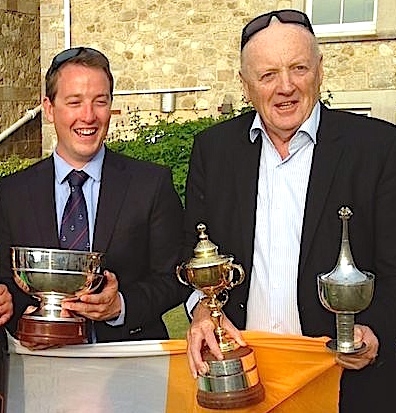 Ross MacDonald and ICRA Commodore Nobby Reilly at the Royal Yacht Squadron in Cowes in July 2014 after Ireland had won the Commodore’s Cup. At the ICRA Conference in Limerick last weekend, McDonald won a special award for his season’s results in 2015 with his X332 Equinox, while Nobby Reilly stood down after his successful years as Commodore, handing over the helm to Simon McGibney.
Ross MacDonald and ICRA Commodore Nobby Reilly at the Royal Yacht Squadron in Cowes in July 2014 after Ireland had won the Commodore’s Cup. At the ICRA Conference in Limerick last weekend, McDonald won a special award for his season’s results in 2015 with his X332 Equinox, while Nobby Reilly stood down after his successful years as Commodore, handing over the helm to Simon McGibney.
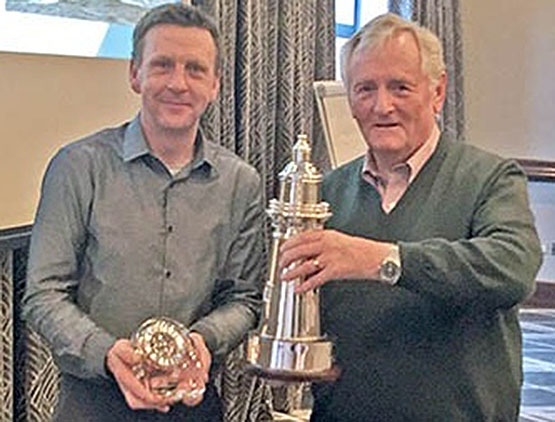
New ICRA Commodore Simom McGibney presents the “Boat of the Year” trophy to George Sisk of the Royal Irish Yacht Club, skipper of the Farr 42 WOW.
Work is going on behind the scenes to provide a strong defence this summer, but Anthony O’Leary wasn’t in Limerick to tell us about it, as he was away on his annual participation in America in the Viper 640 Championship, which just wouldn’t be the same if O’Leary wasn’t taking part - so much so that last year, he wasn’t present when his name came up as “Sailor of the Year” in Dublin, for he was away then too, Viper racing in the sun.
But other top sailors were there to round out the conference with the annual awards such as special performances by the likes of Dave Cullen with Checkmate XV and Ross Macdonald with Equinox and, while the ICRA Boat of the Year presentation, with warm acclamation, went to George Sisk of WOW, who not only admitted that his well-tested craft usually races with a crew of average age 53, but if he himself didn’t happen to be on board, the average age came down considerably………..And in case you think becoming ICRA Boat of the Year is all about glamour racing in sunshine, we close with a photo of WOW and the JPK 950 Alchimiste crawling towards the starting line for the Dun Laoghaire to Dingke race on the sort of damply windless evening that most folk would much prefer to spend comfortably at home.
It isn’t always glamour and warm sunshine and pleasant breezes. 2015 ICRA Boat of the Year WOW on a damp and windless evening approaching the start of the 280-mile Dun Laoghaire to Dingle race with the JPK 960 Alchimiste.
Cork Week is Launched on Board LE Roisin in Cork Harbour
Cork Week is aiming to return to its glory days in July with amibitious plans for the event revealed this lunchtime at a regatta launch on board Irish Naval Service vessel, LE Roisin writes Claire Bateman.
Minister for the Marine Simon Coveney took time out from a busy political schedule to attend today's ceremony in Cork Harbour.
Held on a biennial basis by Royal Cork Yacht Club, Volvo Cork Week is one of Ireland's Grand Prix sailing events. It takes place from July 10th to 15th, and primarily attracts sailors for the quality of its racing.
As previously reported by Afloat.ie, this year’s racing includes a new event, the IRC European Championships, which will be an event in itself, based on the platform of Volvo Cork Week. The first edition of the RORC IRC National Championship took place in 2000, and has done so every year since. There are now seven IRC National Championships throughout the world, but up until now, there has been no continental event.
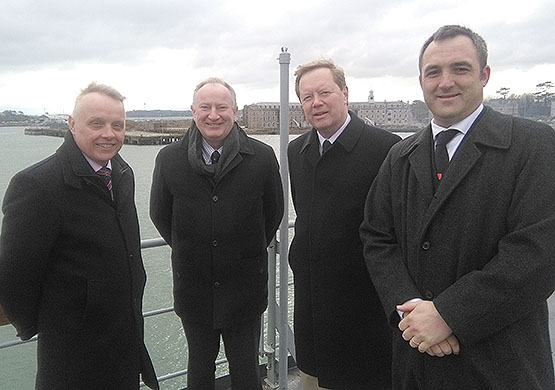
Mark Whitaker and Adrian Yeates of Volvo with Royal Cork's John Roche and Kieran O'Connell on the LE Roisin. Photo: Bob Bateman
Cork Week Chairman, Kieran O’Connell said he was feeling very confident that Volvo Cork Week 2016 will be a unique and exciting event, both on and off the water. 'It is a great achievement for Ireland to be given the chance to host an event of this calibre and we need to make it an event that will set the standard for future years'.
Some of the boats already entered include Anthony O’Leary’s new Ker 40 Antix. Anthony has been Captain of the Irish Commodores Cup Team on two occasions and has enjoyed successes too numerous to mention here. Tim Goodbody’s new J109 White Mischief from the RIYC will be showing her paces, The Tingle families’ new Alpaca X34 will also compete in their new X34. Ronan Harris from the RIYC will sail his J109 Jiga Maree, Paul O’Higgins also RIYC and another very well known and successful sailor has also entered. Kinsale YC Commodore Tom Roche will sail Meridian a Salona 45. Charlie Frize formerly a 1720 sailor will sail his Mills 36 from The Clyde Royal Northern and Clyde Y.C. French sailor Eric Gicquel will sail ‘Black Jack’ from Saint Malo.
The intention is for the IRC European Championships to be held at a different European location annually. The fact that the Royal Cork Yacht Club has been selected to host this inaugural IRC European Championship is a huge honour and reflects the esteem in which the entire Volvo Cork Week Organising Committee are held. As Afloat.ie reported earlier, this year’s event will also feature the inaugural Beaufort Cup, which invites sailing teams from their associated national services to race. The Beaufort Cup, supported by the Irish Defence Forces and part of a series of Irish Government commemorative events in 2016, hopes to develop bonds between national team members and international colleagues: 50% of each team must be active in any service they represent and it is anticipated that defence force teams from a number of countries will compete and also other services such as Police, Fire, Rescue, RNLI and Coastguard.
Minister Coveney, himself a life long member of the Royal Cork Yacht Club announced the official launch. He gave a very interesting talk On the Beaufort Cup. He also said how much he would like to sail in Cork Week 2016 but that would depend on how busy he might be at the time. The smile on his face said it all and he got a great cheer and applause for that. He has the gift of always speaking in a most interesting way and today was no exception He also spoke about his three special interests, Cork Harbour, Sailing and the Navy. Also present amongst the distinguished gathering was the French Ambassador to Ireland, Monsieur Jean Pierre Thébault, who also spoke very interestingly about the Beaufort Cup and its history and connections with France and Cork. Major General Kieran Brennan of the Beaufort Cup, Deputy Chief of Staff Operations, also spoke about the Beaufort Cup and it surely appears this is going to create great interest during Volvo Cork Week. Also present was Colonel Max Walker, British Defence Attaché, representing the British Ambassador to Ireland His Excellency Nicholas Chilcott.
Representing the Royal Cork Yacht Club were Admiral John Roche, Vice Admiral Captain Pat Farnan, Hon Treasurer, Pat Harte, Rear Admiral Dinghies Stephen O’Shaughnessy, Simon Brewitt, Chair Marina and Facilities Committee and Michelle D’Arcy, Chair Bar, House and Communications Committee. Also returning in her capacity as co-ordinator of Cork Week is April English.
Taking over as Director of Racing for 2016 will be Royal Cork’s well known and Ronan Enright with Mike O’Connor, International Judge, acting as PRO.
Mark Whitaker, CEO of Johnson & Perrott Motor Group commented, “Johnson & Perrott Mahon Point is delighted to once again partner with Volvo and the Royal Cork Yacht Club in supporting this high calibre event in the international racing calendar. Volvo Cork Week is a fantastic regatta that combines both serious competition and fun and which contributes very significantly to the sport of sailing and to the local economy.”
“With competitor interest at a high level, our team are looking forward to what promises to be yet another outstanding week for sailors and spectators alike” added Mr Whitaker, who himself is an experienced sailor and long-time member of the Royal Cork Yacht Club.
In addition to top class racing, the fabled on-shore tented village lets all crews interact socially in a fun way, which has become one of the main ingredients in the success of Volvo Cork Week. Saturday will see the family fun day to be held in the Village of Crosshaven with a myriad of events to attract all the members of the family and this will be attended by Dermot Bannon of RTE’s ‘Room to improve’. On Sunday the RNLI luncheon will take place and this will be hosted by RTE’s Francis Brennan of ‘At Your Service’.
Adrian Yeates, Managing Director of Volvo Car Ireland commented "Volvo Car Ireland, are looking forward to what promises to be a very exciting event in Crosshaven this Summer. This is the second year that Volvo, in conjunction with Johnson and Perrott Motor Group, will be the title sponsor of Volvo Cork Week, thus celebrating our continued relationship with sailing in Ireland and throughout the world.”
Yacht Handicap Fees Increase for 2016
Yacht handicapping fees will rise by 12.5% for the coming season.
An average sized boat, such as a Sigma 33, will now have total handicapping costs of €177 in 2016 as opposed to €162 in 2015. This breaksdown as follows: ECHO registration is €42. IRC online registration is €13.50 per metre, an increase of €1.50 per metre (12.5%)
The Irish Sailing Association (ISA) is the administrator for both the local ECHO and international IRC handicap systems. IRC certs are processed for the ISA by the London based Royal Ocean Racing Club (RORC) who govern the IRC rule.
The ISA's CEO Harry Hermon says IRC fees are set in € for Irish boats at the beginning of each year. 'The IRC fee structure sent out with the renewals in January 2016 and showed a 12% increase which is due to the sterling exchange rates. There are no changes to the ECHO fees for 2016. Handicap fees will not be reviewed again until 2017'
Ireland has a national cruiser racer fleet estimated between 500–700 boats.
Meanwhile, handicaps will be a focus at the 2016 ICRA conference when it gets underway at the Castletroy Hotel in Lmerick on Saturday, March 5th.
The pow–wow will receive a presentation from the promoters of the ORC handicapping system that is gaining popularity as an alternative to IRC. Florida's recent Key West Regatta in Florida was split between the two systems.
Speaking to the Irish Times last Friday, former ICRA commodore Norbert Reilly said: “We have no idea what ORC is but would like to know and especially why it is making so much progress overseas.
ICRA also plan a review of the ECHO system for 2016.
IRC Yacht Handicap Expands Its Reach in Asia
The IRC rating rule has been used by racing owners in Asia for many years, with major IRC regattas well established in Hong Kong, Thailand, Malaysia and Singapore. In the last few years Japan and mainland China have benefited from the use of IRC for their racing fleets, and now the RORC Rating Office and the Chinese Taipei Sailing Association (CTSA) are pleased to announce that IRC will be used for Taiwan-owned boats in 2016, further strengthening the IRC fleet in East Asia.
The local yachting scene in Taiwan has recently been boosted by the relaxation of harbour entry and tax rules, in an effort to help develop the domestic market in leisure yacht ownership as well as attracting visiting yachts. Against this positive background the CTSA, as the World Sailing Member National Authority for the country, is enthusiastic in its responsibility to organise and encourage fair yacht racing for their sailors and recognises the IRC rating system as a superior method of handicapping its local fleet.
The CTSA plans to hold IRC racing at the Penghu International Regatta Series this summer and looks forward to introducing IRC rating to boat owners in Taiwan.
Taiwan lies around 180km east of China, so using the IRC rating rule will allow Taiwanese owners to race not only in their local waters but also in events organized by neighbouring China and Hong Kong, and indeed any other IRC race worldwide. Visiting sailors who hold IRC ratings will also be able to join in with races in Taiwan and have the opportunity to race in a different mixed fleet and boost local entries.
IRC is one of only two International Rating Rules as recognised by World Sailing, and annually issues 8000 certificates to 6000 boats racing in hundreds of club and international events in almost 40 countries worldwide. In all but one of the famous offshore classic races, including the Rolex Fastnet Race, the Rolex Sydney Hobart Yacht Race and Rolex Middle Sea Race, the major trophy is awarded to the overall winner in IRC.
New 'IRC European Championships' To Be Staged At Cork Week
The first ever IRC European Championship will take place during Volvo Cork Week, 10-15th July 2016, Royal Cork Yacht Club has announced.
The new event in the RORC Calendar will be hosted by the Crosshaven club, in the sailing grounds of Cork Harbour and the Atlantic Approaches.
The first edition of the RORC IRC National Championship took place in 2000, and has done so every year since. There are now seven IRC National Championships throughout the world, but up until now, there has been no continental event.
"When the Royal Ocean Racing Club was approached by the Royal Cork Yacht Club to host the first IRC European Championship, our response was positive and immediate. We are now working together to finalise the details”, commented Michael Boyd, Commodore of the Royal Ocean Racing Club. “The IRC European Championship will be an event in itself, based on the platform of Volvo Cork Week, which is a long-established and well-organised IRC regatta. The timing of the IRC European Championship, in the middle of July, works well in relation to the RORC IRC National Championship in the Solent in June and as a precursor to the Brewin Dolphin Commodore's Cup between 23-30 July. The intention is for the IRC European Championship to be held at a different European location annually.”
"Royal Cork Yacht Club is honoured to be chosen to host the prestigious Royal Ocean Racing Club's inaugural IRC European Championships, during Volvo Cork Week 2016. This is a great honour for Irish sailing, and the fact that Ireland has been selected as the host nation for the first ever IRC European Championship, will guarantee support from IRC boats from all over Ireland as well as overseas.” commented Kieran O Connell, Chairman of Volvo Cork Week. “It is also a great reflection on the Race Management here at Volvo Cork Week, and shows the confidence that RORC have in The Royal Cork Yacht Club’s ability to manage an event of this scale. On the racing front, Volvo Cork Week 2016 will not disappoint, with plans already well underway to host a championship that will both meet and surpass the requirements of this unique world class event both on and off the water. We welcome all in advance”.
Winners Decided at IRC Double Handed National Championship
Organised by the Royal Southampton YC, in conjunction with the Royal Ocean Racing Club, the second edition of the IRC Double Handed National Championship took place in the Solent, last weekend. 37 teams took part racing in three IRC Classes, lack of wind on the Saturday was the undoing of the passage race but two excellent races were held on the first day in the Central Solent.
Race Director Robert Lamb, sets the scene for the championship. “With high pressure dominating the south coast of England racing was delayed on Friday until a south westerly settled in after 4pm. Two races were then run: a laid marks 'sausage triangle’ followed by a round the cans race. Wind eventually strengthened to 10-12 knots to provide good racing. Saturday was disappointing with not enough wind to run the scheduled three hour passage race. So two races only were completed for the championship. All competitors were invited to the RORC Cowes Clubhouse for supper, which had a terrific atmosphere.”
IRC ONE
Won by Neil Martin's Sunfast 3600, Hot Cookie with Phil Barnes as crew. Runner up was Tim Octon's Corby 35 Njos, crewed by Rob Larke and third was Rob Craigie's Sunfast 3600, Bellino, crewed by Deb Fish. Hot Cookie won both of the races held and Neil Martin and Phil Barnes have been racing together for about ten years.
“Both Phil and I come from a dinghy background and we still race in dinghy events. We started sailing two handed together in my J/133 about nine years ago and the main reason for the change was that it is a lot of fun and we have lots more jobs to do! The J/133 was great offshore but we wanted about we could sail well inshore, so we initially sailed a J/97, then moved on to the Sunfast 3600, which is really set up for two handed sailing.
The important factors in coming out on top in the National Championship were teamwork and experience. We have been racing two handed together for a long time, we both know what to do in most situations and when things go wrong, we have a better chance of sorting them out. Having sailed a bigger boat previously, the sail handling is easier on a smaller boat. We have been sailing in the Solent now for about 10 yrs and we are beginning to get to know our way around.”
Phil Barnes was quick to point out that starting well was a key ingredient to winning inshore. “Neil typically gets a very good start, which in the short races gave us a big advantage being clear to implement our race strategy. Of all the racing I do, double handed yacht racing on short courses is a huge physical and mental challenge and the most rewarding sailing I have ever done.”
IRC TWO
The largest class racing at the IRC Double Handed National Championship had 15 yachts vying for the class and five yachts took podium positions. Race One was won by the defending champion, Paul Griffith's J/109, Jagerbomb, crewed by his son Mark. William Gough's J/109, Just So, crewed by Christian Jeffries was second and William Newton's J/105, Jelly Baby, crewed by Bill Darley was third. The winner of Race Two was Andrew Roberts' J/105, Jin Tonic, crewed by Bill Edgerley. Second was Mike Moxley's HOD 35, Malice, crewed by Huw Phillips and third was David Franks' JPK 10.10, Strait Dealer, crewed by Graham Sunderland. Jin Tonic's was the class champion by a single point from Jagerbomb with Strait Dealer taking third on countback from Jelly Baby.
“The Royal Lymington Yacht Club organised a series of double handed races back in 2011, and we decided to give it a go and much to my surprise I enjoyed the challenge of adapting a boat that is normally raced with a crew of 7 to one that 2 can handle.” commented Andy Roberts, skipper of Jin Tonic. “I quickly learnt that every manoeuvre took more time and more effort and they should be kept to a minimum.
Racing short handed means you are utterly dependent on your partner, their skills and input both tactical and navigational, as well as the sail handling. The boat needs to be prepared differently, simplify everything, so there was no umming and arring about sail calls, we just use what we have got, remembering that not having an extra 450 kilos of crew weight on the rail meant that the boat was tuned differently so that we could de-power much earlier than usual to keep the boat on it's feet and footing rather than crabbing sideways.
I think one of the things that helped us get a good result was having a clear strategy on the route we were going to take around the course so that we had no last minute panic moves to make, for example, dropping the spinnaker on the correct side for the next hoist. Spinning the kit when going upwind is seriously slow, losing at least half a knot of boat speed for 5 or 10 minutes.
We did not chose a J/105 for any other reason than there were three others in Lymington, yet we have found it to be a super boat for both short handed and fully crewed racing; easy to handle and always feels safe even when surfing along at 14 knots.
To summarise we felt we did well by keeping it simple, so we had time to focus on the race.A big thank you to everyone at the Royal Southampton YC, for all their hard work to give us such an enjoyable regatta.”
IRC THREE
Congratulations to Paul Dunstan and crew Tony Wrath, winners of Race One and runners up in Race Two, winning their class for the IRC Double Handed National Championship, racing Folkboat, Mandarin. Chris Charlesworth's Contessa 26 Meow, crewed by Martin Young, scored a third and a bullet to finish runner up by just a point. Dave Wright's H-Boat, Hubble Bubble crewed by Luke Bradley was third just a point ahead of David & Peter Cowell's Hanse 291, Seahorse.
The third edition of the IRC Double Handed National Championship will be organised by the Royal Southampton YC, in conjunction with the Royal Ocean Racing Club, held in the Solent in 2016, late summer or early autumn – watch this space.
Irish Offshore Sailor Andrew Baker Heads for IRC Double Handed National Championship
Northern Ireland's Solitaire du Figaro sailor, Andrew Baker, will be racing with Solo Round the World Sailor, Mike Golding in RORC's second edition of the IRC Double Handed National Championship will take place in the Solent, this weekend.
A huge variety of keelboats have entered with about 40 teams taking part. Three races are scheduled with no discard. The variety of courses are designed to test all the elements of Double Handed racing with a laid marks course, a round the cans race and a long passage race.
Last year's IRC Class 1winner, Paul Griffiths' J/109 Jagerbomb will be defending their title and Paul will be once again be sailing with his son Mark. Jagerbomb has been competing in the Two Handed class for this year's RORC Season's Points Championship, including the Rolex Fastnet Race.
“I am sure that we will be making more tacks and gybes this weekend than we did for the whole of the Fastnet.” commented Paul Griffiths. “Full on – would be an apt description, especially with the two races on Friday. Racing Double Handed on a short course is very different to offshore. You don't have the time and the space and you are trying to make manoeuvres that you would normally do with nine people not two, which is just crazy but the secret is to avoid getting into problems and to do that you have to be thinking ahead all the time. Looking at this year's entry list there are some top class sailors and this year we have a group of Figaro II's from the Artemis Offshore Academy, which we didn't have last year.”
Artemis Ocean Racing have entered four double handed teams racing Figaro II skippered by talented young aspiring short handed sailors. RYA Match racer and 49er FX sailor Mary Rook. Will Harris, University Student and past Laser 4.7 National Champion. Hugh Brayshaw, Silver medallist at the 470 Junior European Championship. Andrew Baker, Solitaire du Figaro sailor, will be racing with Solo Round the world sailor, Mike Golding.
“There is some real talent and that is why the Artemis Academy is very interesting to me, it is the direct opposite to the opportunities that were available to me when I started racing.” commented Mike Golding. “ Racing on a short course, you are both involved in sailing the boat, all the time, so the biggest thing about this weekend will be knowing where you are going and to get there as cleanly as possible. You don't have the time to go down below and navigate, you have to know the marks of the course in advance and think ahead to the sail set up you will need – you have to mind-map the sequence of events. Figaros are not optmised for IRC, so our first goal will be to beat the other Figaros, but with plenty of corners, if we are slick around them, we might do well overall. It is a pleasure to be involved this weekend, I am an honoury member of the Royal Southampton and the club has always been there supporting me in my projects. The Royal Southampton has been running short handed racing for a long time. Teaming up with the RORC, as an IRC event for the Double Handed series and running the National Championship, has really opened it up to a large number of entries, which is fantastic.”



























